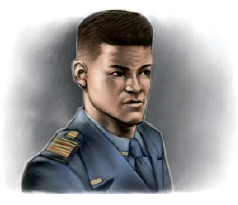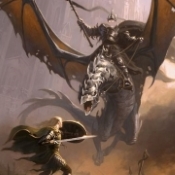|
Epicurius posted:It also used to be the home of the Beast Lords, but they moved to the Beastlands. Which makes sense.
|
|
|
|

|
| # ? Apr 27, 2024 03:23 |
|
MonsterEnvy posted:Which makes sense. It was probably inevitable in hindsight, yes.
|
|
|
|
Cythereal posted:The next plane is Norse mythology with the serial numbers filed off. Oh for fucks sake, they removed Mt Olympus but left the worst offender in? 
|
|
|
|
Epicurius posted:It was probably inevitable in hindsight, yes. I imagine the members of the celestial Urban Planning Commission sitting around a table and nodding sagely at this.
|
|
|
|
Falconier111 posted:Oh for fucks sake, they removed Mt Olympus but left the worst offender in? Well. I think the first layer actually works pretty well thematically. It's the others where the book tries to cram in the rest of Norse mythology that there are problems.
|
|
|
|
Silent Legions: Spells (Part 2) Oops, All Spells! The Merciful Rack of Ibn Baraka (Lv. 2): Magically torture a tightly-restrained subject. Both you and the subject get to make Mental Effect saves – on a success (from either of you), the subject gets to clear themselves of any possession or mind-affecting enchantments, although the unbearable mental agony caused by the spell inflicts Madness on the subject (and the caster too, if neither of you make the save). Obviously, freeing someone from a possessing entity is a classic genre trope, but given how often it happens to PCs (not very), this spell feels more like something you’d seek out an NPC to cast for you rather than something that’s worth permanently learning yourself. Verdict: Fine. The Messengers of the Air (Lv. 2): Open a telepathic link to someone via an arcane connection. Gives you a ten-minute window to chat, or if you’re feeling nasty, you can burn up the arcane connection to force a psychic compulsion on the target, making them irresistibly drawn to the location the spell was cast from. They can save against it, but on a fail they’ll come running by the “fastest means they can safely employ.” Seems pretty handy both for long-distance untappable communication with your friends (who you presumably will have arcane connections on file for) and the odd “get this guy into position” kind of play against a vulnerable foe. Verdict: Great. The Mists of Unveiled Knowing (Lv. 4): You know that thing on cop shows, where the cops are so good at being detectives that they can visualize replays of events from a crime scene? This lets you do that, but in blood. Your blood, to be specific. The spell requires you to draw a circle in blood, taking 1d4 HP in damage for every 3 meters in the circle’s radius. Once cast, the blood coagulates into a mist, which then forms into a soundless but high-resolution replay of the most “emotionally-freighted” events to have occurred in the area in the recent past (although you can pick a different event if you know about another one that happened in the same area). The replay lasts for as long as you can keep chanting (I’d rule a Physical Effect save every like 10 minutes or so), then vanishes into the ether, leaving no trace of blood behind. Verdict: Can’t say no to being a Blood Detective. Probably a little too high-level for what it offers. The Pandect of Light (Lv. 5): This ward takes a full hour to create, but after its completion, your chosen area (no bigger than a mansion) is protected from intrusion by occult entities. Unlike a lot of other spells, there’s no carve-out for the servitors of Outer Gods, or even for godlike entities at all – the protected area is flat-out impenetrable to everyone but humans (and it will block humans who’ve been altered by alien influences). While raising the ward is relatively safe, lowering it is not, as even ending the spell willingly means 5d6 damage with a Magic save to only take half. If the ward is brought down by someone defacing the central sigils, the caster takes the damage straight-up, no save. This is a really powerful spell, and one that’s definitely worth any expenditure in Madness because once it’s up around your hideout, you aren’t likely to need to cast it again. Of course, you’re still vulnerable to, say, a cultist paying someone to just burn your mansion down, but that’s what guard dogs and IR cameras are for. Verdict: Powerful, even if you only get to cast it once. The Ravenous Works of Hazai (Lv. 5): Another of the “make an item to use later” spells, the Ravenous Works require you to first make a small clay manikin, then etch it with arcane sigils. In a fight, you can toss the manikin on the ground, causing the area in a three-meter radius to boil with voracious ethereal worms. If you spend a round within the area, you take 3d6 Damage (and 1d6 Madness if you’re human). Downside is, you take 1d6 damage every round to contain the worms to the circle. You can willingly end the spell on your turn, but if you end up dead or incapacitated, the circle is flung open and spreads by 20 meters in radius for 1d4 rounds before fading away. My feeling on this spell is: by the time you can cast it, you probably can afford a grenade launcher – and grenades deal damage on impact, instead of the “end of your turn” proviso for the Worm Zone. Even if the GM tosses you a bone and lets the worms eat a few cultists, you’ll need a serious combo to keep a more dangerous enemy standing in the circle and not just stepping outside and resuming your murder. Verdict: Creepy. But not great. The Red Expurgation of the Sword (Lv. 1): Despite saying earlier that there’s no such thing as white magic, here’s your Lay On Hands. It comes in two flavours: the “slow” version, which gives your target an extra 1d6+1/level HP back the next time they rest. Of course, nothing’s free in Silent Legions, so the intensely unpleasant feeling of having someone else’s flesh grafted to yours (as the spell manifests) costs you 2 Madness. The fast version heals you more and faster: 2d6+2 HP per level of Occult possessed by the caster, regained on the spot. As you’d expect, the penalties are even nastier: the wounds heal over with scaly, unnatural tissue and the subject’s body fills with subtle tumors that whisper to you, telling you there’s nothing wrong with your body. The tumors fade, but the Madness(1d4+1) doesn’t. Verdict: Very useful, very flavourful, just a great spell all around. Rite of Censing the Crooked Road (Lv. 1): Calls forth a wisp of smoke from a lit flame. The smoke will drift towards any Kelipot gates or dimensional anomalies nearby. That’s it, that’s the spell. Verdict: Yawn City, USA.  Rite of the Wetted Knife (Lv. 5): Remember that earlier spell that let you enchant a weapon? This is another one. It works on all kinds of weapons (not just melee), and allows you to specify a specific type or species of creature who will suffer from this weapon’s attacks. Creatures targeted by this weapon now take full damage and Slaughter rolls from it, even if they’re normally immune or resistant. As well, you get to reroll the Slaughter die and take the better result (remember, on a 6+ you deal triple damage). And no, I don’t think it works on humans – the spell does say “supernatural” creatures only. I dunno, I guess if you know you’re going up against a specific type of enemy (a group of alien soldier drones, say) it’s good, but this is another one I’d probably give to a NPC and let the players hire them as needed rather than forcing anyone to learn the spell themselves. Verdict: Lil’ underwhelming for a level 5 spell. The Safe-Kept Quintessence of Flesh (Lv. 1): Another… healing spell? Each time you cast it, you have to spend an hour with a willing subject in order to collect some of their blood and mix it with various “assorted powders” to make a hundred grams of red healing dust. When the dust is cast over the blood’s donor, their wounds are healed with a “soft, pale tissue that has a vaguely fungal character,” healing 1d8 HP (+2/level of Occult the caster has) on the spot. It does cost one Madness to be healed in this way, but it’s honestly a pretty good deal, especially if your GM will let you whip up a bunch of powder in advance. While this does heal a lot less than the other curative spell, it’s easier to learn, less costly, and lets you prepare doses in advance. For my money, this is the one to get, since the Madness penalties get expensive if you try to use healing as anything other than a “let’s get you back on your feet” last resort kind of move. Verdict: Fantastic. The Scourging Seal of Solomon (Lv. 4): Are you excited for another warding spell?? I am! (Actually, this one’s pretty cool). Basically, you make a little clay disc and shower it with 1d4 HP of your own blood. When you’re ready to use it, you get to choose to place it faceup or facedown. If it’s faceup, you create a 10-meter area that’s warded against supernatural entities, forcing them to make a Magic save to try and enter the area. They can only try once an hour, and if they do break through, they take 2d6 damage per level of Occult the caster possesses. If you place it facedown, it instead works as a proximity mine, dealing the damage instantly to the first creature to get within the perimeter. I love bimodal options like this, and the image of slamming down a magic token like a Magic card fills me with glee. Verdict: Fun and incredibly useful. The Seal of Drowned Kings (Lv. 2): Gives you and yours water-breathing for a full day. Verdict: Just buy a snorkel. The Seal of the Yellowed Fang (Lv. 3): Adorn a beast’s claw or fang with sigils and become King of the Wolves. You can present your sigil-encrusted totem to a natural animal (or a small pack of a given species) and they’ll become docile, obedient, and entirely able to understand your spoken commands for a few hours. Look, is this the most useful spell in the world? No. But do I want bewitch a crow and make him steal a necklace from a cultist base? Yes. Verdict: This rules. Sigil of the Righteous Threshold (Lv. 1): Make a clay amulet, hang it over a door or window, that door or window is now impassable to anyone but you and your friends. Do I even need to say the name of the D&D spell? Verdict: Pretty lame. The Sign of the King (Lv. 3): Another telepathic compulsion spell. Burn an arcane connection and you get to compel the target to perform one act that’s “not wholly contrary to their nature,” with a saving throw if you try to give an order that’s too unthinkable for them. I dunno, I think there’s enough of these already. Verdict: Whocare. The Silvered Blade of Sacrifice (Lv. 1): Transform a small blade into an arcane weapon that can siphon human vitality. When used on a “willing or helpless” human subject, the knife deals 1d4 damage and imbues the wielder with uncanny vitality. In practice, this vitality lets you reroll one unsuccessful attack roll, Physical Effect save, or physical skill check. You have to use it within the hour, and you take 1 Madness for your trouble. I like the flavour of this spell – your Scholar hands over a scalpel to the Tough and tells him to “cut me, bro, it’s all good.” It’s not the most powerful spell we’ve seen, but I can see trading 1 Madness for a reroll as being a trade you might need to make, especially at low level. Verdict: Fun and good. The Staff of Turning Back the Way (Lv. 3): Warding! Warding! Turns a rod into a magic crayon, letting you draw a line of solid, impenetrable darkness that only appears to (and affects) supernatural creatures. The ward is solid, too, taking 1d6+2 rounds of solid attacks to be broken down or otherwise lasting until nightfall. Look, I dunno what to say. It seems fine. Verdict: If I see one more spell requiring me to write the word “ward” I’m going to be upset.   Stealing the Road to Hell Stealing the Road to Hell (Lv. 5): My personal vote for best spell name in the game. This is the closest you get to teleportation, and as you’d expect, it’s both tricky and unpleasant. In short, the ritual lets you rip a hole in the fabric of reality, opening a temporary Way that takes you through a “nightmarish Kelipah of alien form and terrible shapes, one barely tolerable to humanity.” Although the journey appears instantaneous, you have to spend subjective hours journeying through the twisted and hostile Kelipah. You can target any destination you can imagine, but it’s going to be a lot safer if it’s somewhere you’ve been before, and easier still if you’ve studied it beforehand and set up mystical beacons to guide your path home. Mechanically, how this works is you have to make an INT/Occult check to see how your journey ends, versus difficulty 6 if it’s a place you’ve prepared or all the way up to 14 if you’re trying to go somewhere you’ve only read or heard about. On a failure, you end up somewhere alien and unpleasant, and most likely not even on Earth (basically, you hand your GM a golden ticket for that Dreamlands adventure they’ve been wanting to run). I love this spell, it makes teleportation risky but still doable and it’s brimming with flavour and plot hooks. Verdict: (Lv. 5): My personal vote for best spell name in the game. This is the closest you get to teleportation, and as you’d expect, it’s both tricky and unpleasant. In short, the ritual lets you rip a hole in the fabric of reality, opening a temporary Way that takes you through a “nightmarish Kelipah of alien form and terrible shapes, one barely tolerable to humanity.” Although the journey appears instantaneous, you have to spend subjective hours journeying through the twisted and hostile Kelipah. You can target any destination you can imagine, but it’s going to be a lot safer if it’s somewhere you’ve been before, and easier still if you’ve studied it beforehand and set up mystical beacons to guide your path home. Mechanically, how this works is you have to make an INT/Occult check to see how your journey ends, versus difficulty 6 if it’s a place you’ve prepared or all the way up to 14 if you’re trying to go somewhere you’ve only read or heard about. On a failure, you end up somewhere alien and unpleasant, and most likely not even on Earth (basically, you hand your GM a golden ticket for that Dreamlands adventure they’ve been wanting to run). I love this spell, it makes teleportation risky but still doable and it’s brimming with flavour and plot hooks. Verdict:  STEALING THE ROAD TO HELL. STEALING THE ROAD TO HELL. Truths Written in Red (Lv. 2): By pouring your own blood over a book (1d4 HP for a short one, half your maximum HP for a longer tome), you are able to read and understand it even if it’s written in an unknown language or encrypted. Fortunately, when you end the spell, the blood vanishes into thin air, leaving the book unharmed. This spell definitely requires your GM to actually use the language rules, but honestly in most cases I think I’d rather run a mini-adventure to find a translator than use up Madness learning a spell that’s this limited. Being able to read ciphertext is handy, but it’s another “how often does this come up” kind of problem. Verdict: Bloody mediocre. Unsealing the Vault of Wisdom (Lv. 2): The ANTI-ward spell. When used on a warded door or portal, you either break through any protective spells (including magical traps) or receive an insight into the “most practical way” to sunder the wards. Doesn’t work on mundane locks or more general protective spells (like every other warding spell in the game), so it seems pretty limited to countering that one specific ritual. This feels like one you give to an NPC if your players are somehow using the Sigil spell too much? Otherwise, it seems pretty useless. Verdict: Lame. The Vermilion Mark of Sanctity (Lv. 4): A Faraday cage for telepaths, basically. You create an amulet that makes the wearer immune to possession, psychic interrogation, or thought-scrying. Of course, it works both ways – while wearing the amulet, you can’t exert your own telepathic abilities. Definitely a spell for NPCs who might make and sell these amulets, not something I’d be super excited to have as a player. Verdict: Nah. The Walker Beneath the Earth (Lv. 3): It’s noclip, baby! While the spell is active, the caster and their allies can effectively pass through solid matter as if it were air. You’re also immune to physical damage while insubstantial, which is a nice perk. The cost is 1d4 Madness per round spent in the intangible form, which seems pretty steep to me. Also, since this spell isn’t one that makes a little item you can cash in later, it means you have to carry out the 10-minute ritual in situ, so it’s mainly going to be used to quickly get you through a few rings of walls (or similar). The Madness cost is pretty nasty, but then again walking through walls is pretty useful in a game largely about going places people don’t want you to go. Verdict: Pretty good! The Walker Beneath the Moon (Lv. 1): Everyone gets darkvision and a boost to Stealth (when everyone in the group rolls a Stealth check, everyone gets to use the single best result). Not much to say on this one. Verdict: Just buy night-vision goggles. Whispers of the Scribe (Lv. 1): The librarian’s dream. Casting it on a specific tome gives you an understanding of the book’s key stats: language, age, magical potency, and a summary of the book’s general topic. You can maintain the spell for as long as you want in order to quickly sort through a lot of books. I feel like I’ve been a lot more negative with the second half of the spells, but when you get crap like this, I dunno what to say. Sorting through a pile of old books is something you should do in a montage, not book-by-book on a round-by-round basis. Verdict: No thanks. Thoughts so far: That’s all of the spells! Overall, I’m happy with most of them – only a few feel out of step with the game’s overall balance and tone, and even the boring ones could conceivably be used as hooks for NPCs (“we gotta find that magic librarian!”). There’s no gross-out horror, which again reinforces the idea that your PCs are supposed to be at least a bit heroic. Sure, a lot of the spells are weird and uncanny and unpleasant, but there’s nothing I’d consider to be in poor taste or just pointlessly nasty (cf. Shadow of the Demon Lord). Some of the coolest spells are written in such a way as to inspire story concepts, which is definitely more narrative help than I’ve ever gotten from a D&D spell list. Next time: Black magic, made to order. I need spell concepts from the thread – take a look at the two tables below and pick an option from each. I’ll roll up the first three-ish concepts posted in the next update! The spell's effect  The spell's origin 
|
|
|
|
Who could say no to a black magick that enhances a living being's capabilities due to a "gift" from an alien god?
|
|
|
|
BinaryDoubts posted:Next time: Black magic, made to order. I need spell concepts from the thread – take a look at the two tables below and pick an option from each. I’ll roll up the first three-ish concepts posted in the next update! I’ll take a spell somebody in a Kelipah produced to get in and out of it, mostly to preemptively force you to explain Kelipahs Also guess what I found! The intro fiction from the Technology chapter posted:December 24, 2169 – Gukhidda downport, in Imperial space: So the Vilani don’t know what programming is.
|
|
|
|
BinaryDoubts posted:The spell's effect How about it creates a disaster or calamity for the effect and it's origin is an eruption of occult evil?
|
|
|
|
How about a spell made by an ancient human sorcerer that conjures a desired object... or a whole bunch of desired objects? what I'm saying is: gate of babylon
|
|
|
|
Awesome, thanks for the suggestions. I'll get to work on some dark sorcery for y'all.
|
|
|
|
Silent Legions: Black Magic  The Incantations of Night posted:Aside from the “safer” sorceries of gray magic, there remains a vast corpus of occult knowledge that is not so limited in its damage to the human mind. These black magics require such horrific sacrifices of sanity, morality, and humanity that those who practice them can hardly be said to be human. All the same, some sorcerers are willing to make this sacrifice in order to wield the terrible miracles these dark arts allow. Black magic is fundamentally stronger, more effective, and more easily mastered than gray magic. By abandoning any concern for humanity or sanity the sorcerer is able to touch on powers that a more cautious wizard would never dare to enlist. Since there’s no mechanical definition to black magic, the random tables in this section are purely to help you (the GM) come up with interesting spells and the requirements for their casting, as the whole reason you have black magic rituals is to give the players a chance to stop them. I’ll go through each suggested spell, rolling or picking on any tables as necessary, and hopefully we’ll end up with at least a tome’s worth of vile sorcery. Let's start with Leraik's suggestion of a spell that was made by a human sorcerer to conjure a whole bunch of desired objects (ala the Babylon Gate). Before I start fleshing out the spell’s lore, let’s first find out what it conjures by rolling a 1d8. I rolled a 4, meaning it summons “an eldritch object,” and also gives us the word “Genesis” to use in the spell’s name. Rolling a few times on the Spell Name Creation table (this game has the best tables) gives us the words Text, Hidden, and Gods. Finally, I roll how powerful it is (major, one day to cast, 1d3+1 needed components) and what those components are. First, it needs a specific type of object – in this case (another roll to decide), an intricately-crafted focal object. I rolled a 1 on the d3 so we only need one more component, namely a specific time: the night of a new moon. Putting it all together (and grabbing a synonym or two), we get: Genesis of God’s Thrice-Hidden Scriptures, a black ritual created by the sage known to us as Freya, sometimes called Freya Witch-Caller or Freya the Damned in certain apocryphal translations. Little survives of Freya’s life aside from what can be gleaned from her runic spells, but it’s believed she lived in exile (based in part on cave carvings that some claim to be in her hand). We do know, though, that her spellcraft surpassed anything known to the still-nascent occult brotherhoods in Saxony, or indeed, anywhere in the world. The spell requires the caster to first create the focal object: an intricately-carved iron tablet, its surface covered in runes etched based on complex formulae that shift over the course of the day and night the tablet’s creation requires. Once constructed, the tablet must be carried and erected at the peak of a mountain by the caster’s hand alone. To cast the spell requires the darkness of a new moon night and the caster’s complete focus as they run their fingers over the runes in a meditative pattern. They must repeat the pattern for hours, even as the rough iron rips open their flesh, painting the tablet in the caster’s softly-glowing blood. At the spell’s completion, a knife-sharp wind swirls down the mountain, ripping apart the skin and bone of anyone not attuned to the caster. At the peak, the caster is momentarily displaced into the Kelipah known in some tongues as the Divine Archive. Within, black shelves of rock stretch out to infinity. The air tastes of ozone, like in the moments before a lightning strike. And everywhere – piled up on bleak monoliths, stacked into vertiginous piles, swirling and dancing in currents of unseen force – lie tablets cast in a sickly gold metal. Each tablet bears a single word in a language known to every being in the universe; a killing-word, a command of unmaking written in the feverish hand of some unknown Adversary. The caster cannot perceive the word – the spell’s magic inures them to the effect that it has on every other being in the universe (barring, perhaps, some Outer Gods): the instant unmaking of their very essence. The caster leaves the Archive with as many tablets as their wounded and exhausted arms can carry, each one a loaded gun capable of destroying almost anything in our world. Merely perceiving the word triggers the unmaking effect, causing the victim to evaporate into nothingness over a few painful seconds. After being used, a tablet will follow its victim’s fate and boil away into the ether at the next sunrise. The last person to successfully carry out this ritual is believed to have done so in 1797, likely by a man known only elliptically from some prison records as “Wikkan.” He proved that the tablet’s effects are reproducible by printing an etching of the word in a London paper (the name of which is now scrubbed from most archives and public records). A sizeable portion of the paper’s circulation saw the word and were utterly annihilated, leading to Wikkan’s eventual capture and death-by-decapitation at the hands of England’s occult service (then known as the Irregulars). No one has been known to successfully cast this spell in the last two centuries. Should someone attempt its casting now, the careful propagation of the word across the Internet would likely result in the deaths of a large portion of the Earth’s population.  Spell two comes from us from DEFCON Clown, who suggests a spell that creates a disaster or calamity and whose origin is an eruption of occult evil. Rolling on the disaster table gives us the word Calamity and the effect of summoning torrential, unnatural rain. Grabbing a few random words on the Name chart results in Invocation, Esoteric, and Demons. Finally, rolling for power gives us Grand, requiring 1d4+3 (I ended up with 6) needed things and a whopping 2d6 days to cast. Casting this spell requires the following things (and given that there’s only 6 types of requirements I can roll on, I just rolled once on each table):
The Esoteric Invocation of Hell’s Calamity is a black magic ritual with no known creator. Instead, its origins can be traced back to a recurring occult phenomena, first recorded by Pliny the Younger. After travelling to Pompeii shortly after the eruption of Vesuvius, Pliny recorded finding rings of impossible sigils etched into the ashen corpses of the city’s residents. His careful illustration of the sigils marked the first time this spell’s words were committed to paper, although he never knew the significance of them during his life. His original illustrations were copied, modified, and passed down through the years, with occult scholars throughout history adding their own embellishments. Most were drawn from their fertile imaginations, but a handful of these additions came from further sightings of the sigils, filling out the spell’s structure as disaster after disaster struck the world. The first workable version of this ritual is believed to have been created by the Brothers of the False Dawn, a splinter group of the True Dawn cult that formed in a schism nearly 500 years ago. Due to the difficulties in translating the unknown tongue and the various embellishments that have muddied the spell’s form over the years, it is a corrupted, reduced version of its true self. Some believe the spell’s origins to be the words spoken by an Outer God before Earth’s Great Deluge. Even in this lesser form, however, it is still a ritual of terrifying power, capable of calling forth a torrential rainstorm that can wipe a city, nation, or continent from the map in a matter of days. By tradition, the spell’s two-week casting period must begin with the murder of a local potentate appropriate to the desired scale of misery – historically, a nation’s king or city’s governor were the ones targeted. After killing the potentate with their own hands, the spell’s caster will begin to see immaterial stormclouds gathering in the skies above. As they continue down the ritual path, the clouds grow darker, eventually overwhelming the sun and moon, filling the sky with towers of dark cloud. At the spell’s culmination, these clouds will be pulled from the caster’s reality into the world’s, instantly shrouding the caster’s target in endless storms. There are other requirements, of course. Some are likely unnecessary, introduced by charlatans or fools to the spell’s blueprint, but such is the power of Fate that avoiding a part of the ritual simply because you think it unimportant will almost certainly result in your demise. The spell must be carried out at the site of a massacre and requires the deaths of several adults (three, in one translation, seven in another). Unsurprisingly, these two requirements are often fulfilled at the same time. After sacrificing your victims (either at the site of a historical massacre or at one you’ve just created), you are anchored to the immediate area for the next two weeks. By this time, the incessant noise of phantom thunderclaps will be ringing in your ears, preventing you from sleep or conversation or rational thought. You will need to read from a trusted translation of the spell (of course, there are many more forgeries than real copies of this ritual), intoning words in a language that slowly shifts from your native tongue to a hissing, snarling string of words spoken in a guttural, throat-wrenching register. The thunderclaps will help keep you awake for the vigil that follows as you repeat the impossible words for days without end. You cannot eat or drink mundane food, but instead must subsist on the blood of a willing (or unwilling) individual who lives within your targeted area. Blood transfusions at dawn and dusk keep you alive as static electricity courses through your nerves. Finally, at the end of the two weeks of preparation, the spell will collapse into the real world assuming you’ve timed the end to arrive during the vernal equinox. Rain will fall, slowly at first, then faster and faster, growing more vicious with each passing moment. Thunder sings out as flashes of lightning illuminate the impossibly-dark sky. Those foolish enough to remain outside will see the distant shadows of vast alien creatures gathering at the edge of the rainfall. The storm lasts until the earth beneath it is barren and empty as it was at Creation, whole cities reduced to rubble and washed away in the tide. The caster will not survive this; the epicentre of the tidal downpour is on the spell’s casting ground. After the clouds fade, all that remains will be wet earth and rings of deadly sigils where a city once stood. Thoughts so far: Rolling on random tables is fun as hell. Obviously most of the stuff above was just written without reference to any kind of table, but I wouldn’t have had so much fun writing up the spells if the basic info you get didn’t give me a ton to work with. You can create a custom spell way more simply, too – all you really need to know is what it does and what it needs to use it in a game. I just wrote all that backstory because it seemed like a good time. It’s definitely not a requirement! Next time: A custom Kelipah and a black magic ritual to get in and out.
|
|
|
|
One gold piece equals two electrum pieces, each of which equals five silver pieces, each of which equals The Deck of Encounters Set Two Part 7: The Deck of Taxes and Fees 32: The Measure of a Man The PCs are in a small town and an official comes to tax them 2 gp for each weapon they have that’s 2 feet or longer. They will not stand for even nonviolent resistance, threatening to tax magical items as well. The next day they’ll be taxed again for the same reason. “This will happen every day until the party leaves town or thinks to ask for a receipt of some sort.” Ehh, too straightforward to be amusing, really. But I could see keep, assuming there's some adventure reason that the PCs are running around town actively every day. That way this official can keep interrupting other events. I wouldn't use it if that's all that was happening each day. 33: Over the Barrel The PCs enter a walled city with a crime problem. Shortly, they’re accosted by an official who claims they violated some ordinance, but it’s obviously a trumped-up charge. He’s trying to extort a favor (“community service”) from them. Specifically, he wants them to infiltrate the local thieves’ guild and report “complete details of the guild members’ illicit exploits” for two weeks. He has no idea where or how to locate them. Uh… no? gently caress you? Actually, I would enjoy playing this guy as an official in over his head, grasping at straws. And the other cool thing is that the card specifies that “the guild in question is newly formed, and the novice abilities of the dozen or so members make spying on them quite easy.” The PCs wandering into a kerfluffle between an incompetent city government and an equally-incompetent thieves’ guild? Sounds like fun to me. Keep. 34: Armed and Dangerous The PCs come to a town where the locals shy away from them, the constable and town watch follow them, and eventually they’re arrested and placed in jail. Basically, this community greatly distrusts murderhobos for some reason, and the constable will give them a lecture about how they don’t tolerate ruffians, etc. Eventually they’ll be released, but their weapons will only be returned when they’re leaving town completely. If this is a drastic departure from usual cultural attitudes, then I feel like they need some kind of… backstory? Without an idea where the town is coming from, I’m not sure that I’d want to run this. Even if the PCs go along with being arrested (which seems unlikely), then what? They get released, say "well, let's never go there again," and leave? The game-time seems like it could be better spent. Pass. 35: License to Fill A merchant hires the PCs to “watch a site in the bazaar” for her because she plans to open a new booth there. I guess this is some first-come, first-served claim-staking deal? But I don’t completely get it, because the constable comes and wants to know why they’re “lying in wait for the merchant who has just purchased a new plot.” And if merchants own individual plots, why do you need someone stationed there? Anyway, the encounter is supposed to be a bureaucratic runaround where the PCs don’t have the paperwork to be employed as laborers and need to get it, and in the meantime they fail their task and someone else claims the spot. (The constable promises to leave someone there, but doesn’t.) Doesn’t seem like fun. Pass. 36: Departure Times The PCs approach a walled city. There’s a 2 sp toll per head to enter, but as they come in they hear another group of adventurers being charged 20 gp per person to leave. This is apparently a “major contributor to the town’s economy,” and the law will insist that they pay. They’ll be pursued relentlessly by trackers if they escape town without paying, at least until they’re a week’s travel away from town. I’m not sure this makes any sense, or is particularly fun to play out. Pass unless I wanted to lean into it and play up the insane fanaticism with which they enforce this law that prevents people from leaving.
|
|
|
|
I'm mildly amused by the "small charge to enter, big charge to leave"-idea, though. It could be used for other situations, but what it requires is something that lets it be used as a quest hook, i.e.: "You can either pay 500 gold a head to leave the Cool Zone, or... you can do this quest for us." Something that the officials are using to force adventurers to pick up their dirty work in some sense. Though the issue there is also a bit: if they're powerful enough to force these killer hobos to do their work, should they not also be powerful enough to actually do it themselves?
|
|
|
|
That seems a ridiculously stupid policy for the town to have. "Why yes, trapping dangerous and heavily armed vagrants inside our defensive walls while their supply of coins dwindles will have no drawbacks."
|
|
|
|
It would work better in a setting/system where murder-hobos are not capable of taking out a small city if angered. You need someplace where ten dudes with crossbows are a reasonable threat and not 'one fireball and we're on our murderhobo way'. Also the people angry at murderhobos probably have reasons, considering murderhobos, but the whole issue with murderhobos is that NPCs consistently struggle to stop them from murdering, leaving them free to hobo as they please. I'm not certain why they'd expect them to comply with an arrest.
|
|
|
|
Oh man, those spells are hella cool.
|
|
|
|
Night10194 posted:It would work better in a setting/system where murder-hobos are not capable of taking out a small city if angered. You need someplace where ten dudes with crossbows are a reasonable threat and not 'one fireball and we're on our murderhobo way'. So, you recommend WFRP then? 
|
|
|
|
Falconier111 posted:So, you recommend WFRP then? Ironclaw would work, too. Ten guys with crossbows is not something you want to bet on unless you've got a hell of a shield or cover. In general you just need a setting/system where 'I'm 6 levels above you' doesn't translate into 'any number of you can no longer seriously threaten me'.
|
|
|
|
If this thread taught me anything it's that WFRP is one of the best choices for running vaguely Tolkien inspired fantasy.
|
|
|
|
It’s been a little while, but I think “pay a big toll to leave” is how New Jersey works. (Or at least the NJ Turnpike.)
|
|
|
|
Also it's 20 GP and it's D&D money. That's nothing. The PCs use that much money to load their slings for sport.
|
|
|
|
Night10194 posted:Also it's 20 GP and it's D&D money. That's nothing. The PCs use that much money to load their slings for sport. Right, either the party will be reasonable and throw the 20gp at these people, or the whole thing will become a campaign-derailing garbage fire as the party declares war on this city-state on principle. (I have def seen groups that would do the latter.) I guess if you think your group would do the second one and want that to happen you could keep it, but if you think your group will do that, my feeling is that you don't need an encounter card to create that situation, it's just going to happen no matter what.
|
|
|
|
Night10194 posted:It would work better in a setting/system where murder-hobos are not capable of taking out a small city if angered. You need someplace where ten dudes with crossbows are a reasonable threat and not 'one fireball and we're on our murderhobo way'. Characters don't need to be high level to be a threat. Enough mercenaries who blew through their savings in town and need to leave town to make more can be a public order threat. They don't need to be able to take the city, enough mercenary swordsmen and crossbowman can create a major crime problem when they are within the walls and can hide in the city. I can't find the right clip from Rome to quote exactly, but: "men with swords never starve"
|
|
|
|
You could work it into a absurdist adventure where the city uses the toll money to hire adventures to bring back adventurers. Options to play along with the farce or just leave. With a secret third path where you unionize the town adventure population and accidentally form a guild.
|
|
|
Servetus posted:Characters don't need to be high level to be a threat. Enough mercenaries who blew through their savings in town and need to leave town to make more can be a public order threat. They don't need to be able to take the city, enough mercenary swordsmen and crossbowman can create a major crime problem when they are within the walls and can hide in the city. I can't find the right clip from Rome to quote exactly, but: "men with swords never starve"
|
|
|
|
|
Leraika posted:Oh man, those spells are hella cool. Thanks 
|
|
|
|
Zereth posted:No, see, the guards need to be a threat to those people, specifically the PCs, to actually enforce this fee. A typical P group who's made it past the "low level scrubs" phase is absolutely capable of just going "lol no" and blowing the gate off the hinges and leaving anyway. I didn't check the suggested level range of this card, but it probably is aimed at low-level scrubs. Still doesn't necessarily make it fun, though. If you're going to do it, I agree with leaning way into it like The Skeep suggests.
|
|
|
Ultiville posted:It’s been a little while, but I think “pay a big toll to leave” is how New Jersey works. (Or at least the NJ Turnpike.)
|
|
|
|
|
Epicurius posted:Planescape itself put the Greek gods in there, and made Mt. Olympus part of the realm. They share Arborea with the elves (and apparently enjoy partying together). The place used to be the home of the giant gods and the titans, but the elvish pantheon drove off the giants and the Greek pantheon imprisoned the Titans. Also, in Planescape, the third level used to be the home of the Egyptian gods, but they wandered off, except for Nephythys. It also used to be the home of the Beast Lords, but they moved to the Beastlands. Does Planescape fill the third layer with mystery ruins, or is that just third edition?
|
|
|
|
Nessus posted:No, no - you pay to leave the turnpike. It's not our fault that outsiders prefer not to do so, leaving us with abundant reserves of sweet corn, tomatoes, and graft. Nor is it exactly your fault that paying to leave the turnpike also generally means paying to leave the state, for those just passing through, but it does allow for some good road jokes, so I guess a valuable service.
|
|
|
|
 Chapter 2: The Eighth and Ninth Interstellar Wars and the Final Battles By the end of the Seventh Interstellar War, the man in charge of the entire region and maybe a sixth of the Imperium, Arashir Sharrukin (both an unstable and sadistic rear end in a top hat and a competent administrator and leader), had finally decided the situation on the rim had decayed so far he couldn’t farm dealing with it out to one of his subordinates. He gathered a massive war fleet from every corner of his domain, sent a full, detailed report to Vland on the poo poo going down in the region, and formally moved his court up to within a couple months of the front line (about as close as he could get without putting it at direct risk). The plans he drew up were simple. No maneuvering, no espionage, no strokes of strategic brilliance. Instead, he would send a fleet several times larger than anything the Confederation had faced yet at them in the numbers they couldn’t resist, relying on Vilani logistical expertise to keep such a fleet functional and well supplied. And when they attacked in overwhelming force in 2228, they really did sweep aside every attempt to stop them. The Terran Grand Admiral at the time, a man named Josip Degen, immediately understood even the Confederation’s main battle fleet couldn’t hope to stand up to that many Vilani ships, so he switched to attacking supply lines, sabotaging bases, and generally harassing the fleet until its logistical needs prevented it from advancing any further. The resulting stalemate lasted until Admiral Albadawi launched his campaign.  Manuel Albadawi was in many ways emblematic of Terran society in the later Interstellar Wars. Born in Cairo to a Spanish biotechnician and a Palestinian engineer in 2183, he spent his childhood bouncing from place to place on earth until his parents accepted a job posting on the formerly Vilani world of Iilike, leaving him behind to finish his schooling before he joined them at 18. The experience changed him. He developed close relationships with his Vilani neighbors and gained a knack for relating with them he put to use over and over again for the rest of his life, but he came to hate Vilani culture and developed a “Terran Man’s Burden” complex that drove him to join the Navy. After serving well in the Seventh Interstellar War and rocketing up the ranks in peace time, when the Eighth broke out he was made Rear Admiral and assigned command of Nusku’s defense fleet, at once a vitally important posting and one that would never see action unless the war was already lost. So Albadawi launched an attack of his own. If I’m reading between the lines right, Degen did not plan on Albadawi breaking ranks like that and in fact he may have defied orders otherwise, but his campaign proved so effective his superiors were forced to hold any objections. Like Degen, Albadawi understood he couldn’t hope to challenge the Vilani fleet directly, but unlike Degen, occupied as he was by keeping the main Vilani fleet trapped, Albadawi was able to launch raids deep into the Vilani interior, sacking outposts and bases, breaking supply lines far enough behind the front lines the main fleet couldn’t hope to retaliate, and even capturing major worlds (including the provincial capital). While Degen adapted his tactics to keep the main Vilani fleet from going backwards as well as forwards, Albadawi ran a highly romantic campaign that borrowed more from the-free-trader-turned-pirate tradition then that of the standing navy, scraping by with a fraction of the supplies his fleet theoretically needed to keep functioning while sabotaging the Vilani home front, leaving the Imperial fleet so undersupplied Degen started driving them back despite having a fraction of their numbers. In 2236 Albadawi put the final nail in the coffin by helping the Vegans stage a massive revolt that ripped their entire pre-Consolidation Wars empire out of the Imperium, leaving the Vilani fleet without hope for survival; a few months later it surrendered and the Dumushirs opened peace talks, since Arashir Sharrukin had fled briefly before his defeat. The peace treaty doubled the size of the Terran Confederation and granted the Vegan Polity independence for the first time in over 1000 years, together tripling the Confederation’s territory to draw on. Manuel Albadawi, Campaigns (2254) posted:If an admiral wants to defeat the Vilani, he has to approach his campaign like a matador in the ancient sport of bullfighting. At first glance, the matador seems to have no chance; all the advantages of strength, speed, and ferocity seem to be on the side of the bull. But somehow, whenever the bull charges, his horns never touch anything but the red cape. Eventually, the matador’s sword slips in on the unprotected flank. Now, if you’re familiar with Roman history, you might be getting serious Second Punic War vibes, especially from Manuel Albadawi, Scipio Africanus’s science fiction clone: brilliant, driven, ambitious, and deeply charismatic. Granted, Albadawi was humbler and more serious then Scipio ever was, and his opponent was no Hannibal. But between him, Degen’s Fabian tactics, and Arashir Sharrukin’s ultimate fate, you could be forgiven for thinking the Eighth Interstellar War deliberately echoes it. And just like Scipio, Albadawi established a tradition of charismatic, independent commanders that would eventually overthrow their government. Several years later Terran command received word of a fleet several times larger than even the one they’d faced in the last war making its way down to the frontier. Sharrukin’s message had reached the capital and the Emperor and his council had dubbed the Terran Confederation an existential threat; the incoming fleet was the Imperium’s main battle fleet, one undefeated since at least the late Consolidation Wars. It came alongside a final declaration of war in 2246 and advanced uncontested into Vegan space, laying siege to their home world before Albadawi (now Grand Admiral) sprung his trap. Terran scientists had produced two massive technological advances late in the previous war, too late to put into practice then but by the start of the Ninth universal in the Terran Navy. The first, the galaxy’s first known particle weapons, rendered Vilani battleships instantly obsolete. Up until that point Terran ships emphasized powerful close range weapons and Vilani ships emphasized missile batteries; standard Terran doctrine had them slipping by, sabotaging, or sneaking up on Vilani ships to avoid the inevitable missile barrage before surprising and dissecting them at close range. Those particle beams massively outranged even the best Vilani missiles and turned even their biggest and heartiest battleships into targets. The second, working jump-3 drives, made intercepting or outmaneuvering Terran fleets impossible; Vilani planners hadn’t believed jump-3 drives were even possible and their still-lavishly-obeyed standard combat doctrine had no way of accounting for ships moving that fast. While historians typically dub 2256 the end of the Ninth Interstellar War, since that was when Terran leaders stopped their advance to consolidate, technically the war wouldn’t end until 2302; both the Vilani Grand Admiral and Sharrukin died in the fighting, and there wasn’t anyone within several months travel with the authority to sign a treaty.  Yeah, see? Civil War generals. In fact, Terran combat and expansion never stopped until the end of the period. While initially some Terrans entertained the idea of declaring the wars over (since at this point the Ziru Sirka was dead in the water), it quickly became clear that Vilani loyalists – including Khugi Sharrukin, Arashir’s successor – would continue to launch retaliatory strikes and stage loyalist revolts indefinitely. The next few decades saw a series of campaigns through the disintegrating Imperium intended to bring it all under control as fast as possible, usually outpacing lines of communication in the process. By then the Imperial chain of command had completely collapsed and Terran forces were often out of contact for weeks or months until they got their conquests under control, so local rulers or commanders on both sides usually struck treaties and conducted diplomacy in their own right. Even after Khugi surrendered honorably in 2266 and offered access to his bureaucracy to Terran authorities, they found themselves barely able to control the 1300 worlds under his nominal leadership, let alone vast swathes of territory far beyond that. By the way, this period contains the book’s final recommended campaign setting; characters take the role of soldiers in the Terran fleet or army charged with advancing through a subsector and securing it, mixing combat, diplomacy, espionage, and economics (as in, logistics) to the group’s pleasure. The obvious risk here is the campaign breaking down into thinly veiled imperialist apologia (because that’s what this is), but a disciplined enough group should be able to easily skim past it. Or they won’t, you never know with nerds.  Good to see Earth fashion hasn’t changed in a solid 300 years. Anyway, with the end of the Interstellar Wars proper and resulting social shifts, the Confederation’s population finally started drifting away from its government. For most of the period Earth had dominated the Confederation in both economic production and population, but for the last few wars the bulk of both lay with former Vilani worlds. The colonists were developing their own identity as colonials, not Terrans – and yet control of the Confederation still rested with the same five Earth nation-states who founded it. In 2280, after an ethnically Vilani but culturally Terran intellectual published a book explicating that growing split, the Confederation started spying on its Navy to root out potential problems. This spying rarely amounted to more than information gathering, but once the secret got out relations between the home world and the colonies tanked even further. The trend only continued under Grand Admiral Kovacs’s service. Kovacs was himself ethnically Hungarian, but he grew up on a previously Vilani world in a family filled with Vilani; while much more friendly to Vilani culture than Albadawi, if anything he was even more devoted to expanding the Confederation. After a period of decorated service in the Ninth Interstellar War, he spent the 2260s working for Naval Intelligence on Terra before spending the next couple decades winning victory after victory; he was in no way a military genius, but he always brought his squadrons home alive and established an excellent track record of diplomatically pacifying potentially rebellious groups. In the 2280s, as the so-called “Great Schism” group between Tara and the rest of the Confederation, Terran command decided that, despite his colonial origins, between his time on Earth and connections Kovacs was unlikely to prove resistant to Terran control, so they skipped over other candidates without his record (even if they had better connections the homeworld) and made him Grand Admiral. He promptly moved his headquarters deep into the Imperium, dismaying naval authorities who expected him to set up shop back on Terra like the three Grand Admirals between him and Albadawi had; by the time they decided (as it turns out, falsely) that he had slipped entirely out of their control on the frontier, his reputation had grown so much they couldn’t hope to gather the political capital to remove him. Hirohisa Mori, Free Trader posted:One Kaareshuri offered me 10 credits for a used tin can. The zinc in it would redeem half an acre of land. I couldn’t do it; I ended up just giving it to him. They’re going to take my union card away when I get back to Terra. In 2288, Kovacs mounted the last major campaign of the era. By that point Terran forces had advanced all the way into the core Vilani territories, but resistance kept building every day and showed no signs of stopping; despite being as desperately outgunned as the Terrans were at the other end of the period, Vilani troops fought them tooth and nail every step of the way. So he hatched a plan. Intelligence told him that the home territories of three minor races (the Darmine, Geonee, and Suerrat), each only a couple months travel from the frontline and each important in their own way to Vilani control of the entire Imperium, were all independently ready to revolt against Vilani rule. It took 10 years of some of the fiercest fighting the period had ever seen, but by 2298 all three had risen in revolt and crippled the Imperium’s ability to fight back. When word got to the capital, the last extant Vilani fleet, gathering at Vland itself for one final campaign, mutinied and took the Emperor prisoner. Kovacs met with their leaders in 2303 and negotiated a formal surrender. The Interstellar Wars were over. Fun fact. After his surrender, Khugi Sharrukin spent the rest of his life in comfortable imprisonment by the Terran Navy. However, with his blessing his children and grandchildren intermarried with Terrans and firmly embedded the Sharrukin clan into Terran life. The ship that took Kovacs to meet with the Emperor and accept his surrender was captained by Khugi’s great-grandson. With that, the Terran Confederation’s central government fell into bickering on how to administrate an area over an order of magnitude larger than that they’d controlled at the end of the Ninth Interstellar War, so Kovacs took action on his own initiative. Instead of waiting for Terra to send along bureaucrats, he instead stripped his staff to the bone and sent naval officers to govern huge swathes of territory – we’re talking people going from commanding patrol boats to ruling worlds with billions of people. The only reason half the known galaxy didn’t melt down into chaos was because most of the still-intact Vilani bureaucracy worked with their new Terran rulers to keep everything from flying apart.  Hiroshi Estigarribia, a face to remember. And at that point the timeline ends abruptly because the next major event started the next period of galactic history. I was going to give a brief outline of the future of the galaxy and how the Interstellar Wars shaped it here, but this post is long enough already. I’ll save that for the conclusion. However, what I won’t do is use the subsector generation rules later on because none of you pricks you gave me your opinions on using it. So there. Anyway, the next post will backtrack over 100 years back to the Empty Peace and we’ll examine Terran society at the time up close. E: naval is not spelled “evil” Falconier111 fucked around with this message at 02:13 on Jul 16, 2020 |
|
|
|
I have to admit, it feels a bit too... easy, in this background, for the Terrans. Like they're always smarter than the Vilani, and outside of the first couple of conflicts they never suffer any real losses and just keep going from strength to strength. The setup also feels a lot like it's hard to do anything but a story that focuses on the Terrans and the Vilani. From what I remember of the Traveller editions I read, the galaxy was a lot more open and less dominated by any great big monoculture imperiums, though obviously there were certain concentrations of power around.
|
|
|
|
Manual of the Planes: 3.5E Ysgard (Chaotic Good) Planar Traits: Normal Gravity, Normal Time, Infinite Size, Mildly Positive-Dominant, Mildly Chaos-Aligned, Divinely Morphic, Normal Magic Ysgardian petitioners are immune to fire and acid, resistant to electricity and sonics, and return to life the next day if slain on Ysgard. Ysgard is the great battlefield of eternity, where heroes adventure and do battle forever and rise anew each day if they fall. Ysgard is the home of the valiant and brave, and those who accept no authority. Ysgard is totally not Norse mythology crammed into a single plane. Ysgard is a plane of perpetual epic adventure, where a biting wind is always at a soul's back. The seasons here are long and intense, the terrain rugged in the extreme, and the wildlife hungry. Throughout Ysgard's layers, the terrain tends strongly towards the mountainous, cut through by rushing rivers (some of which are holy water, part of the Oceanus) and covered in dark forests. As with other Upper Planes with the minor positive-dominant trait, colors and sensations are far more intense on Ysgard than on the Material Plane, to the point of feeling not quite real for visitors used to the Material Plane. Even visitors to Ysgard have reported a feeling that the plane is subtly reacting to them by throwing obstacles in their path, never anything they can't overcome but always something that requires real effort. This is the nature of Ysgard, souls content with a peaceful life seldom wind up here. Planar portals on Ysgard are typically one-way, and not for the faint of heart: many require a soul to leap off a cliff or are otherwise in locations of extreme peril. Petitioners on Ysgard tend to be subtly different from how they were in life. Frequently they're taller and more muscular, with more and wilder hair. Most of them wear less than they did in life. There's a certain wildness to the plane that the souls of petitioners respond to and are changed by. However, not every Ysgardian petitioner is a bare-chested (or for women, wearing a fur bikini) barbarian or ranger. Loners, rebels, and free spirits of all stripes are drawn to Ysgard where they can prove their mettle eternally - and not necessarily through physical combat. One of the most common reasons for visitors to travel to Ysgard are seeking out the soul of a master artisan even more crotchety as a petitioner than they were in life. Dwarves are notably common in Ysgard, berserkers and battleragers at odds with the lawful tendency of dwarven society. Society on Ysgard is informal and typically small in scale. Small villages sometimes form, typically populated by petitioners not inclined to combat but nevertheless felt the call of eternally proving themselves against a challenging plane, but more common are migratory camps of petitioners that travel and fight together. Powerful warlords in Ysgard sometimes attract enough followers to build a permanent hall or fortress, but such endeavors are rare. In any form, visitors should always take care when interacting with petitioners on Ysgard: the fact that everyone on the plane heals rapidly, and especially the fact that petitioners arise anew each morning if slain, gives Ysgardians an extremely casual attitude towards violence, even lethal violence. Brawls and duels, often to the death, are a common and accepted way of mediating disputes on Ysgard, and the locals seldom remember that visitors won't get back up the next morning. Ysgardians seldom hesitate to kill each other to prove a point or simply because it would be funny, and in turn shrug it off when they get back up the next morning.  Ysgard's first layer shares its name with the plane, and Ysgard the layer is by far the most heavily populated of the plane's three layers. Land here consists of islands of earth floating in the sky, known locally as 'earthbergs.' Earthbergs range in size from small islands to entire continents, and may be stationary or mobile. The above descriptions of Ysgard the plane's terrain and society primarily describe those of Ysgard the layer on the earthbergs themselves. Earthbergs sometimes collide in spectacular displays of destruction, and it's one reason why settlements on the edges are rare. Those such settlements that do exist almost always have some capability for flight, either through an innate capability of the petitioners, or some magical means of sailing the skies. These villages are trading and transport hubs throughout the layer, and magical sky pirates among the floating islands are not unknown. The Plain of Yda lies on one of the largest earthbergs, and is a vast, flat green space where petitioners have organized an eternal series of tournaments of all flavors. Visitors who do well in the tournaments can find all manner of rewards. Two of Greyhawk's deities maintain their divine realms in Ysgard the layer. Kord the Brawler, god of strength, maintains his Hall of the Valiant as a perpetual party surrounding a gladiatorial arena where party-goers test their strength against each other, typically in unarmed wrestling, and it's not unknown for Kord himself to set aside his sword to challenge particularly promising contestants. Visitors hoping to seek an audience with Kord, or aid from his followers, can count on having to prove themselves in the ring. The Laughing Rogue, Olidammara, also keeps his den here, a giant manor house that resembles nothing so much as several dozen opulent mansions and estates from wildly different time periods and cultures smashed haphazardly together. The estate is filled with endless partying, song, and romance (and pickpockets, would-be visitors take note), though the god himself is rarely in evidence. Sometimes he has genuinely left Ysgard to play some grand prank or other, but he often disguises himself as one of his own guests. The Laughing Rogue is often willing to help visitors, provided they can attract his interest and prove that they can take a joke. Far below the earthbergs lies the scorching, volcanic wasteland of Muspelheim. This layer is treated as having the Fire-Dominant planar trait, and is inhabited primarily by free-spirited fire giants and petitioners from the rest of the plane who have proven their worth to the giants. Society here is more structured than in the floating islands far above, though each clan of giants is fiercely independent. Portals to the Elemental Plane of Fire are common. Beneath the surface of Muspelheim lies the final layer of Ysgard, the subterranean realm of Nidavellir. This is a layer of vast caverns filled with gems and precious metals, and strange forests that require only heat to grow rather than light. Most of Ysgard's master craftsmen are attracted to this layer, which is heavily populated by dwarves, gnomes, and drow. These dark elves are not at all evil like their mortal counterparts tend to, and their realm of Svartalfheim is as firmly Chaotic Good as the rest of the plane, just more reclusive than most. Next time, Limbo!
|
|
|
PurpleXVI posted:I have to admit, it feels a bit too... easy, in this background, for the Terrans. Like they're always smarter than the Vilani, and outside of the first couple of conflicts they never suffer any real losses and just keep going from strength to strength. The Kzin also had clearer strengths and weaknesses, the Vilani mostly seem to be hierarchal and slow-moving, but also arbitrarily good at logistics.
|
|
|
|
|
Nessus posted:The Kzin also had clearer strengths and weaknesses, the Vilani mostly seem to be hierarchal and slow-moving, but also arbitrarily good at logistics. But never so good at logistics that they don't overstretch them fighting the humans or leave them open enough to human raiding for the humans to win. 
|
|
|
|
BinaryDoubts posted:Players can never acquire or use black magic, as the evil required would both make you unsuitable as a protagonist and transform you into something both less and more than human.
|
|
|
|
Falconier111 posted:
I've tried to figure out what this word was autocorrected from to no avail. Unless he really did just send out a legion of Skeletors and Hordaks to rule over the conquered territories...
|
|
|
|
Just Dan Again posted:I've tried to figure out what this word was autocorrected from to no avail. Unless he really did just send out a legion of Skeletors and Hordaks to rule over the conquered territories...
|
|
|
|

|
| # ? Apr 27, 2024 03:23 |
|
Falconier111 posted:Instead of waiting for Terra to send along bureaucrats, he instead stripped his staff to the bone and sent evil officers to govern huge swathes of territory Like, specifically? Or is that just what his navy was comprised of?
|
|
|




























